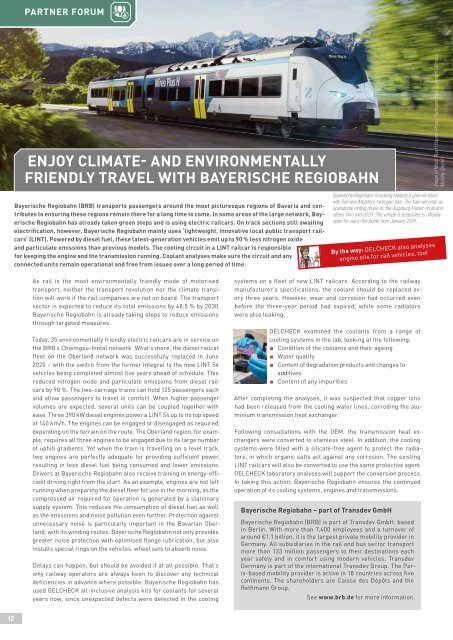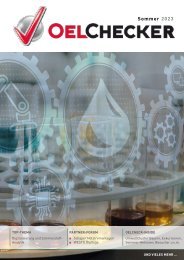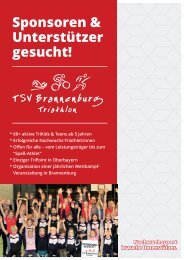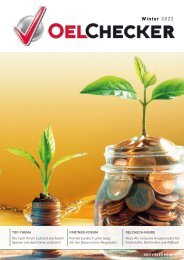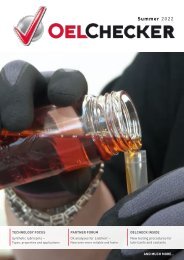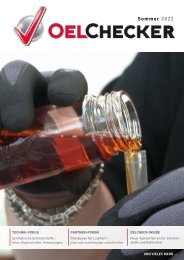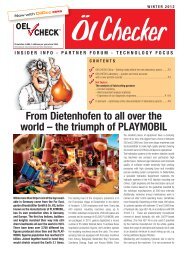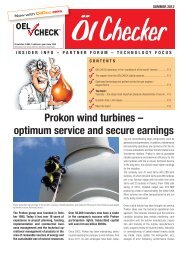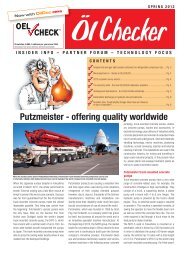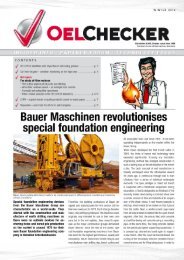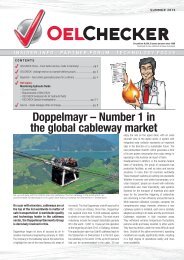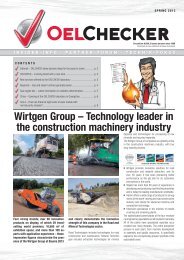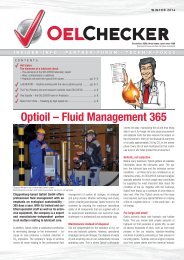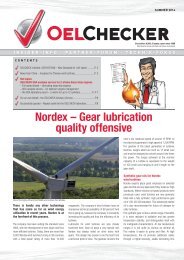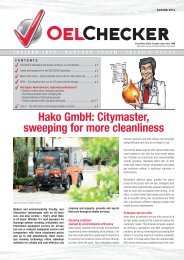OELCHECKER Winter 2022 - English
> HOT TOPIC: Condition-based oil changes – save money and protect the environment > OELCHECK INSIDE: 2022 UN Climate Change Conference / GfT honours Peter Weismann / High-level visit from the USA > TECHNOLOGY: Focus AdBlue – A cleaning agent with no residual alcohol > OELCHECK INSIDE – ALL ANALYSES FROM A SINGLE SOURCE AdBlue – New all-inclusive analysis kits Fuels – Investigations pursuant to DIN now available for almost all types Coolants – New Ultra analysis kit for faults in the cooling system > OELCHECK PARTNER FORUM: Bayerische Regiobahn – Climate- and environmentally friendly travel > FAQ: The tribologists at OELCHECK – Their knowledge and tasks > OilDoc News: OilDoc Conference & Exhibition / Seminar highlights
> HOT TOPIC: Condition-based oil changes – save money and protect the environment
> OELCHECK INSIDE: 2022 UN Climate Change Conference / GfT honours Peter Weismann /
High-level visit from the USA
> TECHNOLOGY: Focus AdBlue – A cleaning agent with no residual alcohol
> OELCHECK INSIDE – ALL ANALYSES FROM A SINGLE SOURCE
AdBlue – New all-inclusive analysis kits
Fuels – Investigations pursuant to DIN now available for almost all types
Coolants – New Ultra analysis kit for faults in the cooling system
> OELCHECK PARTNER FORUM: Bayerische Regiobahn – Climate- and environmentally friendly travel
> FAQ: The tribologists at OELCHECK – Their knowledge and tasks
> OilDoc News: OilDoc Conference & Exhibition / Seminar highlights
You also want an ePaper? Increase the reach of your titles
YUMPU automatically turns print PDFs into web optimized ePapers that Google loves.
PARTNER FORUM<br />
ENJOY CLIMATE- AND ENVIRONMENTALLY<br />
FRIENDLY TRAVEL WITH BAYERISCHE REGIOBAHN<br />
Image of Mireo Plus H Bayern (Photo: Hydrogen train. Copyright Siemens<br />
Mobility GmbH)<br />
Bayerische Regiobahn (BRB) transports passengers around the most picturesque regions of Bavaria and contributes<br />
to ensuring these regions remain there for a long time to come. In some areas of the large network, Bayerische<br />
Regiobahn has already taken green steps and is using electric railcars. On track sections still awaiting<br />
electrification, however, Bayerische Regiobahn mainly uses ’lightweight, innovative local public transport railcars’<br />
(LINT). Powered by diesel fuel, these latest-generation vehicles emit up to 90 % less nitrogen oxide<br />
and particulate emissions than previous models. The cooling circuit in a LINT railcar is responsible<br />
for keeping the engine and the transmission running. Coolant analyses make sure the circuit and any<br />
connected units remain operational and free from issues over a long period of time.<br />
Bayerische Regiobahn is looking towards a greener future<br />
with Siemens Mobility’s hydrogen train. The train will enter an<br />
operational testing phase on the Augsburg-Füssen route and<br />
others from mid-2023. The vehicle is scheduled to officially<br />
open for use to the public from January 2024.<br />
By the way: OELCHECK also analyses<br />
engine oils for rail vehicles, too!<br />
As rail is the most environmentally friendly mode of motorised<br />
transport, neither the transport revolution nor the climate transition<br />
will work if the rail companies are not on board. The transport<br />
sector is expected to reduce its total emissions by 48.5 % by 2030.<br />
Bayerische Regiobahn is already taking steps to reduce emissions<br />
through targeted measures.<br />
Today, 35 environmentally friendly electric railcars are in service on<br />
the BRB’s Chiemgau-Inntal network. What’s more, the diesel railcar<br />
fleet on the Oberland network was successfully replaced in June<br />
2020 – with the switch from the former Integral to the new LINT 54<br />
vehicles being completed almost five years ahead of schedule. This<br />
reduced nitrogen oxide and particulate emissions from diesel railcars<br />
by 90 %. The two-carriage trains can hold 125 passengers each<br />
and allow passengers to travel in comfort. When higher passenger<br />
volumes are expected, several units can be coupled together with<br />
ease. Three 390 kW diesel engines power a LINT 54 up to its top speed<br />
of 140 km/h. The engines can be engaged or disengaged as required,<br />
depending on the terrain on the route. The Oberland region, for example,<br />
requires all three engines to be engaged due to its large number<br />
of uphill gradients. Yet when the train is travelling on a level track,<br />
two engines are perfectly adequate for providing sufficient power,<br />
resulting in less diesel fuel being consumed and lower emissions.<br />
Drivers at Bayerische Regiobahn also receive training in energy-efficient<br />
driving right from the start. As an example, engines are not left<br />
running when preparing the diesel fleet for use in the morning, as the<br />
compressed air required for operation is generated by a stationary<br />
supply system. This reduces the consumption of diesel fuel as well<br />
as the emissions and noise pollution even further. Protection against<br />
unnecessary noise is particularly important in the Bavarian Oberland,<br />
with its winding routes. Bayerische Regiobahn not only provides<br />
greater noise protection with optimised flange lubrication, but also<br />
installs special rings on the vehicles’ wheel sets to absorb noise.<br />
Delays can happen, but should be avoided if at all possible. That’s<br />
why railway operators are always keen to discover any technical<br />
deficiencies in advance where possible. Bayerische Regiobahn has<br />
used OELCHECK all-inclusive analysis kits for coolants for several<br />
years now, since unexpected defects were detected in the cooling<br />
systems on a fleet of new LINT railcars. According to the railway<br />
manufacturer’s specifications, the coolant should be replaced every<br />
three years. However, wear and corrosion had occurred even<br />
before the three-year period had expired, while some radiators<br />
were also leaking.<br />
OELCHECK examined the coolants from a range of<br />
cooling systems in the lab, looking at the following:<br />
■ Condition of the coolants and their ageing<br />
■ Water quality<br />
■ Content of degradation products and changes to<br />
additives<br />
■ Content of any impurities<br />
After completing the analyses, it was suspected that copper ions<br />
had been released from the cooling water lines, corroding the aluminium<br />
transmission heat exchanger.<br />
Following consultations with the OEM, the transmission heat exchangers<br />
were converted to stainless steel. In addition, the cooling<br />
systems were filled with a silicate-free agent to protect the radiators,<br />
in which organic salts act against any corrosion. The existing<br />
LINT railcars will also be converted to use the same protective agent.<br />
OELCHECK laboratory analyses will support the conversion process.<br />
In taking this action, Bayerische Regiobahn ensures the continued<br />
operation of its cooling systems, engines and transmissions.<br />
Bayerische Regiobahn – part of Transdev GmbH<br />
Bayerische Regiobahn (BRB) is part of Transdev GmbH, based<br />
in Berlin. With more than 7,400 employees and a turnover of<br />
around €1.1 billion, it is the largest private mobility provider in<br />
Germany. All subsidiaries in the rail and bus sector transport<br />
more than 133 million passengers to their destinations each<br />
year safely and in comfort using modern vehicles. Transdev<br />
Germany is part of the international Transdev Group. The Paris-based<br />
mobility provider is active in 18 countries across five<br />
continents. The shareholders are Caisse des Dépôts and the<br />
Rethmann Group.<br />
See www.brb.de for more information.<br />
12


